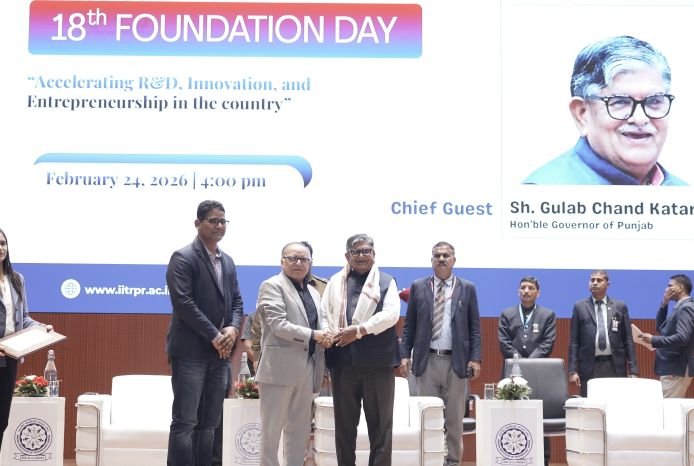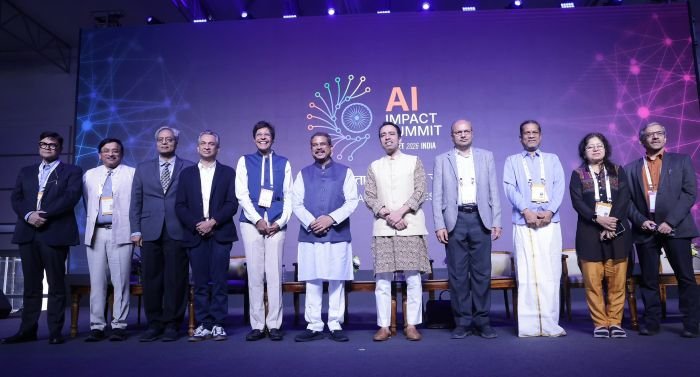
That spirituality is not confined to religious traditions but serves as a bridge between diverse disciplines, fostering holistic decision-making in business and leadership was the force behind the organization of the inaugural XLRI Spirituality Conclave 2025. With the theme “Integrating Spirituality into Business: Drawing Wisdom from India’s Diverse Traditions,” the conclave brought together distinguished scholars, corporate leaders, and thought leaders to explore the role of spirituality in leadership, business ethics, and human flourishing. The event underscored how spiritual values can provide a solid foundation for ethical decision-making, meaningful leadership, and sustainable corporate practices.
Organized by the Centre for Spirituality, XLRI, in partnership with Kardinal König Haus (Vienna, Austria), Lassalle-Haus Bad Schönbrunn (Switzerland), Macau Ricci Institute (Macau), and Manresa Retreat House (Gozo, Malta), the event successfully concluded at Fr Tome Auditorium, XLRI, Xavier School of Management on Feb 14.
The event commenced with a solemn prayer and lamp lighting ceremony, symbolizing the illumination of wisdom and ethical consciousness, led by Dr. Fr. Donald D’Silva, SJ (Dean – Admin & Finance, XLRI). This was followed by inspiring addresses from Dr. Fr. Somy M Mathew, SJ (CSIF, JCSA, New Delhi), Dr. Fr. Marianus Kujur, SJ (Director, XISS, Ranchi), and Ms. Aarti Sharma (Senior Director, The Coca-Cola Company, West India), each offering a unique perspective on how spirituality can shape contemporary business environments.
“Redefining Success: The Spiritual Edge in Business” – Aarti Sharma’s Inspiring Message
Aarti Sharma’s address was one of the most impactful moments of the conclave, resonating deeply with corporate leaders and students alike. She emphasized that spirituality in business is not about retreating from the material world but about engaging with it more meaningfully and ethically. Drawing from her extensive corporate experience, she highlighted how mindfulness, empathy, and ethical consciousness are essential for modern leadership.
She argued that the relentless pursuit of profit often leads businesses away from their moral and social responsibilities, and the antidote to this is a leadership approach grounded in spiritual wisdom. “We need to redefine success,” she stated, “not just as financial gain but as the ability to create lasting, positive impacts in our organizations and communities.”
Her message centered on three critical takeaways for integrating spirituality into business leadership:
- Authenticity in Leadership:True leadership comes from within. A spiritual outlook fosters self-awareness, helping leaders stay authentic and act in alignment with ethical values.
- Empathy and Human-Centric Decision-Making:Businesses must move beyond transactional relationships and cultivate genuine human connections. Leaders who prioritize empathy create more engaged and motivated teams.
- Resilience Through Mindfulness:In a world driven by volatility and uncertainty, mindfulness helps leaders stay grounded, make wise decisions, and sustain long-term organizational health.
Her speech set the stage for the engaging panel discussions that followed, reaffirming that spiritual wisdom has a place in modern boardrooms and corporate strategies.
Panel Discussions: Exploring Spirituality in Business
A series of thought-provoking panel discussions further explored these themes:
- Panel 1: Drawing from Wisdom Traditions(chaired by Fr. Alwyn Rodrigues, SJ) examined the spiritual insights from Hindu, Buddhist, Christian, and indigenous traditions. Panelists included Paramjyot Singh, Dr. Narayan Oraon, Dr. Mohamed Taha Mateen, Mr. Shubhrangshu Roy, Dr. Mujeeb Rahman Kinalur, Mr. Steve Correa, Ms. Bhavana Issar, Ms. Channpreet Bhatia, Dr. Pooja Dabral, and Ms. Roshan Dastur.
- Panel 2: Dancing to Diversity(chaired by Dr. Fr. Vincent Pereppadan, SJ) explored how diverse spiritual perspectives can inform leadership and workplace inclusivity. Panelists included Sunitha Jain, Dr. Kumar Alok, Dr. Abdulla Manham, Dr. Shameel Sajjad, Dr. Vidya Hattangadi, Fr. Joe Kalathil, SJ, Ms. Reema Nayyar, Sister Jaya Pandey, and Dr. Payal Kumar.
- Panel 3: The Paradox of Human Flourishing(chaired by Dr. Fr. Joseph Mathew, SJ) discussed how spirituality can help individuals and businesses navigate the challenges of success and fulfillment. Panelists included Sonajharia Minz, Dr. Rana Bandyopadhyay, Dr. Payal Jain, Ms. Lena Lieberknecht, Dr. Mahesh Deokar, Ms. Ambalika Mirgale, Mr. Chanchal Dey, Ms. Thrisha Santhosh, and XLRI students Mr. Shantanu, Mr. Prakhar, and Ms. Archita.
Valedictory Session: Charting the Path Forward
The valedictory session, chaired by Dr. Fr. Somy M Mathew, SJ, reflected on the key takeaways from the conclave. Certificates of participation were distributed by Dr. Fr. Joseph Mathew, SJ, and Dr. Fr. Vincent Pereppadan, SJ, recognizing the contributions of panelists and attendees.
The Interdisciplinary Nature of Spirituality in Management
Fr. Kuruvilla Pandikattu, SJ, the chief organizer of the event, expressed his deep satisfaction with the initiative, emphasizing its success in bringing together 30 insightful presentations and 70 engaged participants. He reflected on how the conclave highlighted the interdisciplinary dimension of spirituality, reinforcing its crucial role in shaping ethical and effective managers. “This event has shown us that spirituality is not confined to religious traditions but serves as a bridge between diverse disciplines, fostering holistic decision-making in business and leadership,” he remarked.
Conclusion: The Future of Spirituality in Business
The XLRI Spirituality Conclave 2025 reinforced the idea that businesses can no longer operate in isolation from ethical and spiritual considerations. By integrating spiritual wisdom into corporate strategies, businesses can foster workplaces that are not only profitable but also humane, ethical, and sustainable.
The event provided a platform for rich discussions and deep reflections, leaving attendees with a renewed sense of purpose and responsibility. As XLRI continues its commitment to fostering ethical and value-based leadership, the insights from this conclave will undoubtedly inspire future generations of business leaders to build organizations that thrive on both profitability and purpose.








